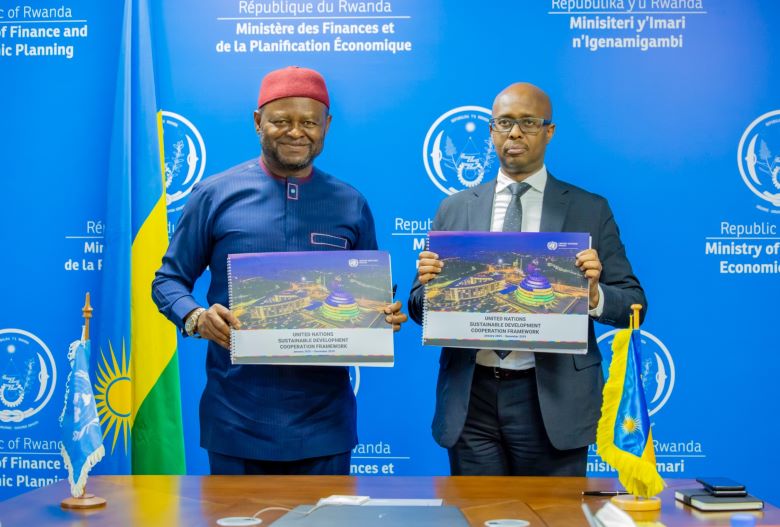Rwanda’s development journey over the next five years is a notch higher after the Government of Rwanda and the United Nations have signed a transformative $1.04 billion cooperation framework.
This strategic pact is designed to drive inclusive economic growth, human capital development, and good governance, all while advancing the country’s long-term development blueprint, Vision 2050.
The United Nations Sustainable Development Cooperation Framework (UNSDCF) 2025–2029 was officially launched on May 20, 2025, during a high-level ceremony in Kigali.
The event brought together delegations headed by Minister of Finance and Economic Planning Yusuf Murangwa and Ozonnia Ojielo, the UN Resident Coordinator in Rwanda, alongside representatives from development partners, civil society, and the private sector.
At the heart of this ambitious cooperation lies a shared goal of leaving no one behind, a close alignment with Rwanda’s Second National Strategy for Transformation (NST2) that responds to the urgent need to tackle global and regional challenges.
The challenges include climate change, food insecurity, and youth unemployment as well as unlocking opportunities through digital innovation and inclusive finance.
“This new Framework is a testament to our enduring partnership with the United Nations and to Rwanda’s vision for a more inclusive, prosperous, and sustainable future. It reflects our shared priorities and values, and our resolve to leave no one behind,” said Minister Murangwa.
The UNSDCF will serve as the UN’s central tool for programming and implementation in Rwanda. It aims to mobilize over $1 billion through joint initiatives, catalytic partnerships, and innovative financing models.
More than 50 national institutions and UN agencies collaborated to adopt the framework, reflecting a broad consensus and national ownership.
On his part, UN Resident Coordinator Ojielo hailed the initiative as a bold step forward in a year that also marks the 80th anniversary of the United Nations.
“As the United Nations turns 80, this framework reaffirms our commitment to delivering as one in support of Rwanda’s transformation journey. It is both a call to action and a platform for results—driven by national ownership, powered by partnerships, and guided by the ambition to achieve the SDGs,” he said.
Key priorities of the five-year plan include, inclusive Economic Transformation, Human Capital Development and Transformational Governance.
They entail creating decent jobs, expanding food systems, integrating green growth and energy access, improving education, healthcare, social protection, and digital literacy for all.
Other specific targets are strengthening institutions by promoting accountability and enhancing justice systems in line with international best practices.
Rwanda’s development goals are ambitious, targeting upper-middle-income status by 2035 and high-income status by 2050, with an expected GDP per capita of $12,476.
By investing in systems that prepare citizens for the jobs of the future and ensuring universal access to clean energy, the partnership sets a precedent for results-driven collaboration in Africa.
Three new UN agencies, the International Telecommunication Union (ITU), UN Office on Drugs and Crime (UNODC), and the UN Office of Project Services (UNOPS), are set to join Rwanda’s development ecosystem in 2025, expanding the current UN presence from 23 to 26 entities.
“With this unified approach, we are not just responding to today’s challenges, we are preparing Rwanda for the opportunities of tomorrow,” Ojielo emphasized.

